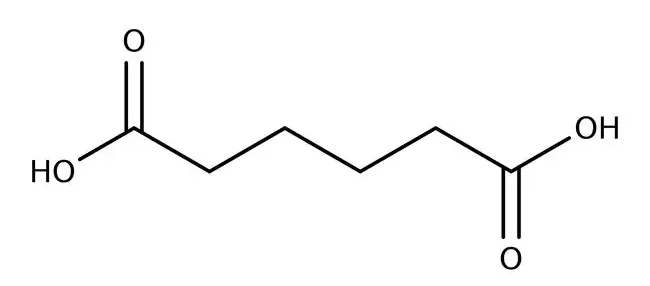Adipic acid is a vital chemical used in the production of various materials, including nylon, plastics, and food additives. Traditionally sourced from petroleum, the production of adipic acid has significant environmental implications. However, the emergence of bio-derived adipic acid—produced from renewable biological resources—offers numerous benefits that align with sustainability goals and the evolving demands of modern industries. In this post, UP Biochemicals will explore the advantages of bio-derived adipic acid and its potential impact on various sectors.

educed Environmental Impact
One of the most significant benefits of bio-derived adipic acid is its lower environmental footprint:
- Lower Carbon Emissions: The traditional production process of adipic acid generates substantial greenhouse gas emissions, primarily due to the use of fossil fuels. In contrast, bio-derived adipic acid is produced from renewable resources, which can help reduce overall carbon emissions.
- Sustainable Feedstocks: Bio-derived adipic acid can be sourced from plant materials such as glucose or lignocellulosic biomass. These feedstocks are renewable and can be grown sustainably, further decreasing reliance on finite fossil resources.
Enhanced Resource Efficiency
Bio-derived adipic acid promotes greater resource efficiency in several ways:
- Utilization of Waste: Many bio-based production processes can utilize agricultural and forestry waste, contributing to a circular economy. By transforming waste into valuable products, the overall resource use is optimized, and waste is minimized.
- Lower Energy Requirements: The production of bio-derived adipic acid often requires less energy than traditional methods. Advances in fermentation and bioprocessing technologies allow for more efficient production, leading to lower operational costs and reduced energy consumption.
Improved Product Properties
Bio-derived adipic acid can offer enhanced properties that benefit various applications:
- Versatility in Applications: The characteristics of bio-derived adipic acid can be tailored for specific applications, from textiles and plastics to pharmaceuticals. This adaptability allows manufacturers to create high-performance materials that meet evolving consumer demands.
- Compatibility with Green Products: As industries increasingly seek environmentally friendly materials, bio-derived adipic acid fits seamlessly into green product lines. Its use can enhance brand reputation and appeal to eco-conscious consumers.
Compliance with Regulatory Standards
As sustainability regulations become more stringent, bio-derived adipic acid offers advantages in compliance:
- Regulatory Support: Many governments and organizations are incentivizing the use of bio-based chemicals to promote sustainability. Bio-derived adipic acid aligns with these regulatory frameworks, making it easier for companies to comply with environmental standards.
- Consumer Preference: With growing consumer awareness about sustainability, products derived from renewable resources are increasingly favored. Using bio-derived adipic acid can enhance market competitiveness and satisfy consumer demand for greener alternatives.
Support for Agricultural Economies
The shift towards bio-derived adipic acid can also bolster agricultural economies:
- Job Creation: The cultivation of feedstocks for bio-based production can create new agricultural jobs, supporting local economies and communities.
- Value Addition: By converting raw agricultural products into high-value chemicals like adipic acid, farmers and producers can increase their income and enhance the overall economic stability of the region.
Conclusion
The transition from traditional petroleum-based adipic acid to bio-derived alternatives presents a myriad of benefits that extend beyond mere chemical production. From reducing environmental impacts and improving resource efficiency to enhancing product properties and supporting agricultural economies, bio-derived adipic acid is paving the way for a more sustainable future.
As industries continue to prioritize sustainability, bio-derived adipic acid offers a viable solution that aligns with both environmental goals and market demands. By embracing this innovative approach, manufacturers can contribute to a greener chemical industry while meeting the needs of their consumers.

